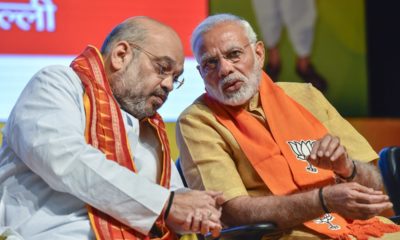World
US ready to help bring Mumbai attackers to justice

Washington: Reiterating that it wants the perpetrators of the November 2008 Mumbai terror attack brought to justice, the US has offered to do anything it can to support Indian authorities in that task.
“We’ve long said just writ large that we want to see the perpetrators of the Mumbai attack brought to justice,” Sate Department spokesman John Kirby said Friday when asked about David Headley turning approver after being pardoned by a Mumbai court.
The US “obviously continue to want to do anything we can to support Indian authorities in that task,” he said while declining to say “anything specific” regarding the Pakistani origin convicted key plotter serving a 35 year sentence in the US.
It “would be inappropriate for me to comment on an ongoing court case like that anyway,” Kirby said and in any case “that’s not an issue here for the State Department.”
When told that Headley, US-born son of a Pakistani father and an American mother, may provide a great deal of information about the attack, Kirby repeated that the US “share an interest in seeing the Mumbai attackers being brought to justice – a terrible, dastardly terrorist attack.”
“But it would be completely inappropriate for me to comment specifically about that ongoing case.”
Asked if the State Department was playing any role in intelligence and information sharing on terrorists as mentioned by Indian defence minister Manohar Parikkar after his meeting with US Defence Secretary Ash Carter, Kirby again declined comment.
” Obviously, India is a very close friend and partner, and I think it’s self-evident in recent years that both our countries have fallen victim to terrorist attacks and continue to need to be vigilant about terrorism perpetrated against our citizens,” he said.
“So it makes perfect sense that we would look for ways to cooperate more closely and to improve the flow of information between our two countries.”
“So I can’t speak for the Defense Department,” Kirby said. “As for the State Department, we maintain good, strong relations with our counterparts in the Indian Government.
“I won’t speak about intelligence matters, but I can tell you that that relationship remains strong, remains vibrant,” he said.
And Secretary of State John Kerry’s “interest is very clear in making sure that the relationship continues to strengthen and grow going forward across a wide range of issues, not just security issues.”
World
Lockdowns in China Force Urban Communities to Defy Censorship and Vent Frustration Online

Shanghai’s rich middle class is leading a wave of online dissent over the strict and prolonged lockdowns imposed in various parts of the country. Chinese internet censorship is struggling as patience is wearing thin in many urban centers, coming up with creative forms of online protests.
Social Media Posts Revealing Lockdown Tension in Shanghai
Drawn-out lockdowns are nothing new in China as authorities insist with the nation’s zero-Covid policy since the start of the pandemic. Currently over This time around, however, metropolitan areas like Shanghai are increasingly difficult to keep quiet, given that its more than 25 million residents have seen weeks of total isolation along with food shortages and many other service interruptions.
Dozens of towns and reportedly over 300 million Chinese citizens have been affected by lockdowns of different severity. As expected, urban netizens have been most outspoken over their difficulties by finding creative ways to get around state censorship and bans placed on topics, news comments and spontaneous campaigns.
Shanghai residents have been using mobile proxies and hijacking seemingly unrelated hashtags to talk about healthcare issues, delivery failures and the overall severity of their situation. The “positive energy” that the Chinese government wants to transmit during the recent prolonged series of lockdowns does not come naturally to those counting food supplies and online censors are working hard to filter words, trending topics and undesired social media sharing.
WeChat groups and message threads are under constant monitoring. Posts questioning the zero-Covid approach have been quickly deleted, including by leading Chinese health experts like Dr. Zhong Nanshan. Video footage is soon censored and protests and investigations are quickly made to disappear.
Where this has not worked, officials have exposed banners with warnings and outright threats like “watch your own mouth or face punishment”, while drones have been patrolling the city skies. Yet, if anything, this has led to further tensions and unspoken confrontation with Shanghai’s educated and affluent middle class.
Creative Online Solutions Harnessing Civic Energy
Announcements by Chinese social media that they would be publishing the IP addresses of users who “spread rumors” have not helped either. Tech industry research has shown that much of Asia’s tech-savvy population has a habit of using mobile proxies and other privacy tools, quickly finding workarounds to browse the internet freely and talk to the world about the hottest topics.
The sheer volume of forbidden posts is already a challenge for the very censorship system, experts explain. Unable to track all trending hashtags, state workers overlook topics that speak about the US, Ukraine or other popular news. Linking human rights elsewhere to their situation, Chinese online dissidents establish their informal channels and “hijack” the conversation to share personal or publicly relevant information about the Covid suppression in their town.
Sarcastic and satirical posts still dominate. Others hope to evade the censors by replacing words from famous poems or the national anthem. One thing is certain – social media, when harnessed with the right creativity, has proven its ability to mount pressure on the government in even some of the most strictly controlled tech environments like China.























